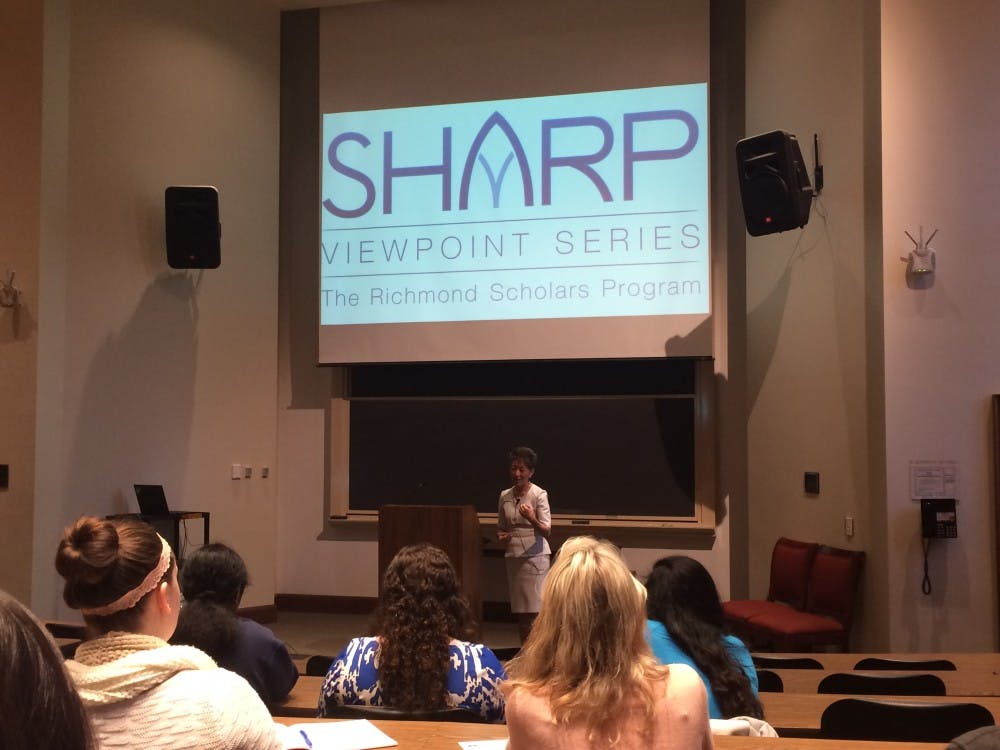When Jane Chu lost her father at age nine, language failed her.
As the assimilated child of Chinese immigrants, Chu struggled to grieve in Mandarin, her father's language, so she turned to music. Piano offered her an emotional vocabulary in which she could find solace and express her feelings about her father's death.
Now, as the chairman of the National Endowment of the Arts (NEA), Chu strives to provide artistic solace for all Americans.
Chu spoke about the transformational power of the arts at Richmond Thursday evening as the final speaker in the Sharp Viewpoint Speaker Series. About 60 students, faculty and community members attended to hear her thoughts on arts funding in schools, the goals of the NEA and her current projects.
Chu paralleled the overwhelming circumstances in which she devoted herself to piano with the rampant political changes surrounding the NEA's formation 50 years ago. She said the NEA was founded in the shadow of John F. Kennedy's assassination amidst bourgeoning conflict with Vietnam, as well as the signing of the Voting Rights Act and the growing women's liberation movement.
"It was amidst all of this change, the change of new freedoms and new frontiers ... [that] the National Endowment of the Arts was born," Chu said.
The major narrative of Chu's brief lecture and Q&A answers was that the arts should be accessible to everyone because of the impact they can have on people of all backgrounds. Chu mentioned numerous examples of low-income schools and communities significantly improving after the implementation of an arts curriculum or programs.
One high school in particular transitioned from an 85 percent drop-out rate to a 100 percent graduation rate after it incorporated arts programming, she said.
Chu drew strong parallels between artistic involvement and academic excellence. She cited an impoverished Californian community that saw a significant turnaround after an NEA grant provided artistic programming in a local public school. She said the standardized testing results at the school improved so much that the state placed a whole arts school in the community.
"We [at the NEA] believe that the arts can transcend us as individuals and produce change across community," Chu said. The NEA supports artistic engagement through grants to schools and communities who apply for arts funding.
During the Q&A portion of the event, Chu clarified that the NEA does not have coercive power over state governments' decisions about arts funding. Instead, Chu meets with state officials to illustrate how crucial the arts are to cultivating smarter and more successful people. If the state governments choose to incorporate this knowledge into their budget planning, it is of their own accord.
"The arts are non-partisan," Chu said.
Enjoy what you're reading?
Signup for our newsletter
Much of Chu's work involves dispelling myths about the arts, such as the arts are unrelated to other fields or people involved in the arts do not make money.
"The leaders of tomorrow are going to be ones who can synthesize different perspectives at the same time and are comfortable with ambiguity," Chu said. "One of the best ways to be comfortable with that ... is to take an art class or practice something related to the arts."
Sofia Nicolet, a freshman, said that she was considering changing her intended major from business administration to art history.
"[Chu is] really optimistic about the arts, which is something not a lot of authoritative figures talk about, because your parents will tell you things like, 'Why would you want to go into the arts?'" Nicolet said. "[Chu] really opened my mind to the possibilities for jobs."
Chu stressed the importance of pursuing the field a person is passionate about, whether that be finance, law or, of course, art.
"When you are engaged in the arts how you want to be, and you look up and three hours have gone by because you love it ... there's something there," Chu said.
Contact news editor Kayla Solsbak at kayla.solsbak@richmond.edu
Support independent student media
You can make a tax-deductible donation by clicking the button below, which takes you to our secure PayPal account. The page is set up to receive contributions in whatever amount you designate. We look forward to using the money we raise to further our mission of providing honest and accurate information to students, faculty, staff, alumni and others in the general public.
Donate Now



